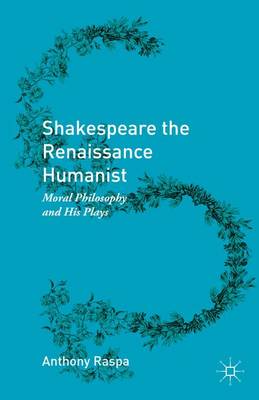
Stock image for illustration purposes only - book cover, edition or condition may vary.
Shakespeare the Renaissance Humanist: Moral Philosophy and His Plays
Anthony Raspa
€ 128.45
FREE Delivery in Ireland
Description for Shakespeare the Renaissance Humanist: Moral Philosophy and His Plays
Hardback. During the Renaissance, moral philosophy came to permeate the minds of many, including the spectators that poured into Shakespeare's Globe theatre. Examining these strains of thought that formed the basis for humanism, Raspa delves into King Lear, Hamlet, among others to unlock what influence this had on both Shakespeare and his interpreters. Num Pages: 195 pages, biography. BIC Classification: 2AB; DSBD; DSGS. Category: (P) Professional & Vocational. Dimension: 216 x 140 x 13. Weight in Grams: 390.
During the Renaissance, moral philosophy came to permeate the minds of many, including the spectators that poured into Shakespeare's Globe theatre. Examining these strains of thought that formed the basis for humanism, Raspa delves into King Lear, Hamlet, among others to unlock what influence this had on both Shakespeare and his interpreters.
During the Renaissance, moral philosophy came to permeate the minds of many, including the spectators that poured into Shakespeare's Globe theatre. Examining these strains of thought that formed the basis for humanism, Raspa delves into King Lear, Hamlet, among others to unlock what influence this had on both Shakespeare and his interpreters.
Product Details
Publisher
Palgrave Macmillan
Format
Hardback
Publication date
2016
Condition
New
Number of Pages
195
Place of Publication
Basingstoke, United Kingdom
ISBN
9781137581112
SKU
V9781137581112
Shipping Time
Usually ships in 15 to 20 working days
Ref
99-15
About Anthony Raspa
Anthony Raspa is a Retired Professor of English at Laval University, Canada.
Reviews for Shakespeare the Renaissance Humanist: Moral Philosophy and His Plays
Raspa (retired, Laval Univ., Canada) argues that contemporary Shakespeare criticism has moved too far away from the philosophical contexts of Shakespeare's own time ... . Raspa seeks to redress this by reading a variety of plays through the lens of Renaissance humanism, offering explanations of how Shakespeare's contemporaries would have necessarily understood various moments in the plays. ... Summing Up: ... Read more
